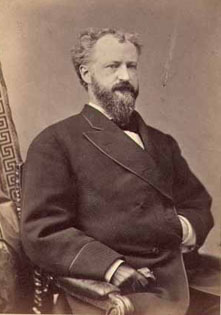| Roscoe Conkling  Born: 30-Oct-1829 Born: 30-Oct-1829
Birthplace: Albany, NY
Died: 18-Apr-1888
Location of death: New York City
Cause of death: Pneumonia
Remains: Buried, Forest Hill Cemetery, Utica, NY
Gender: Male
Race or Ethnicity: White
Sexual orientation: Straight
Occupation: Politician
Party Affiliation: Republican Nationality: United States
Executive summary: US Senator from New York, 1867-81 The American lawyer and political leader Roscoe Conkling was born in Albany, New York, on the 30th of October 1829. He was the son of Alfred Conkling (1789-1874), who was a representative in Congress from New York in 1821-1823, a Federal district judge in 1825-1852, and U.S. Ambassador to Mexico in 1852-1853. Roscoe Conkling was admitted to the bar at Utica, New York in 1850, was appointed district-attorney of Oneida county in the same year, and soon attained success in the practice of his profession. At first a Whig, he joined the Republican party at its formation, and was a Republican representative in Congress from 1859 to 1863. He refused to follow the financial policy of his party in 1862, and delivered a notable speech against the passage of the Legal Tender Act, which made a certain class of treasury notes receivable for all public and private debts. In this opposition he was joined by his brother, Frederick Augustus Conkling (1816-1891); at that time also a Republican member of Congress. In 1863 he resumed the practice of law, and in April 1865 was appointed a special judge advocate by the Secretary of War to investigate alleged frauds in the recruiting service in western New York. He was again a representative in Congress from December 1865 until 1867, when he entered the Senate. After the war he allied himself with the radical wing of his party, was a member of the joint committee that outlined the congressional plan of reconstructing the late Confederate States, and labored for the impeachment of President Andrew Johnson. During President Ulysses S. Grant's administration he was a member of the senatorial coterie that influenced most of the President's policies, and in 1873 Grant urged him to accept an appointment as Chief Justice of the U.S. Supreme Court, but he declined. In the Republican national convention of 1876 Conkling sought nomination for the Presidency, and after the disputed election of this year he took a prominent part in devising and securing the passage of a bill creating an electoral commission. In 1880 he was one of the leaders of the unsuccessful movement to nominate Grant for a third presidential term. With Grant's successors, Rutherford B. Hayes and James Garfield, his relations were not cordial; an opponent of civil service reform, he came into conflict with President Hayes over the removal of Chester A. Arthur and other federal office-holders in New York; and when in 1881 President Garfield, without consulting him, appointed William H. Robertson, a political opponent of Conkling, as collector of the port of New York, and when this appointment was confirmed by the Senate in spite of Conkling's opposition, Conkling and his associate senator from New York, Thomas C. Platt, resigned their seats in the Senate and sought re-election as a personal vindication. Being unsuccessful, Conkling took up the practice of law in New York city, again declining, in 1882, a place on the bench of the Supreme Court, and appeared in a number of important cases. While in public life Conkling always attracted attention by his abilities, his keenness and eloquence in debate, his aggressive leadership and his striking personality. Though always a strenuous worker in Congress, he was not the originator of any great legislative measures, and his efficiency as a law-maker is thought to have been much impaired by his personal animosities. His hostility to James G. Blaine, a fellow Republican senator, was especially marked. He died in New York City on the 18th of April 1888.
Father: Alfred Conkling (Congressman and judge, b. 1789, d. 1874)
Mother: Eliza Cockburn Conkling
Brother: Frederick Augustus Conkling (Congressman, b. 1816, d. 1891)
Wife: Julia Catherine Seymour (m. Jun-1855, 1 daughter)
Daughter: Eliza Cockburn Conkling ("Bessie", b. 1856)
Mistress: Kate Chase Sprague (wife of Senator William Sprague IV)
University: Mount Washington Collegiate Institute (1842-46)
US Senator, New York (4-Mar-1867 to 16-May-1881, resigned in protest)
US Congressman, New York (4-Mar-1865 to 4-Mar-1867, resigned)
US Congressman, New York (4-Mar-1859 to 3-Mar-1863)
Mayor of Utica, NY (1858)
New York State Official District Attorney, Oneida County, NY (1850)
New York State Bar Association 1850
Crédit Mobilier Scandal
Is the subject of books:
The Gentleman from New York: A Life of Roscoe Conkling, 1935, BY: Donald B. Chidsey
Roscoe Conkling: Voice in the Senate, 1971, BY: David M. Jordan
Requires Flash 7+ and Javascript.
Do you know something we don't?
Submit a correction or make a comment about this profile
Copyright ©2019 Soylent Communications
|